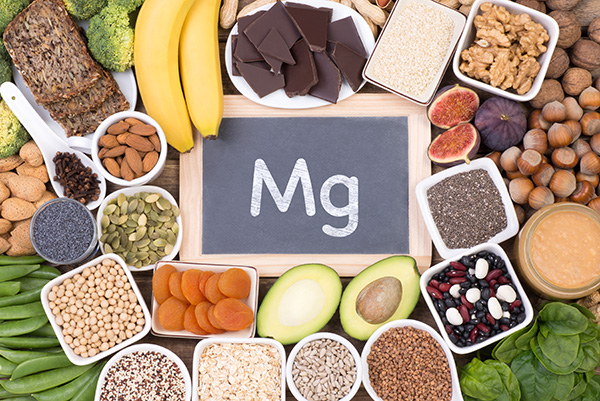- Around 50 percent of Americans don’t meet daily magnesium needs, contributing to fatigue, migraines, muscle cramps and chronic diseases like diabetes and depression.
- Magnesium supports 300+ biochemical processes, including nerve function, blood sugar regulation and blood pressure control, but modern diets and depleted soils reduce intake.
- Deficiency often presents as a “triad” of symptoms that include migraines, nocturnal leg cramps and constipation.
- Low magnesium is tied to diabetes, depression, PMS, heart disease and inflammation, with trials showing rapid mood improvement (within weeks) with supplementation.
- Boost intake via magnesium-rich foods (seeds, leafy greens, seafood) or well-absorbed supplements (glycinate, citrate), but consider potential medication interactions and safe upper limits (350 mg/day).
Many Americans dismiss fatigue, migraines and muscle cramps as normal parts of modern life. Yet emerging research suggests these common ailments may share a surprising root cause: magnesium deficiency. With an estimated 50 percent of the U.S. population failing to meet recommended magnesium intake, experts warn that this widespread shortfall could be fueling chronic health conditions — from diabetes to depression — while simple dietary adjustments or supplementation could offer relief.
Why magnesium deficiency is prevalent today
Magnesium is a critical mineral involved in over 300 biochemical reactions, including muscle and nerve function, blood sugar regulation and blood pressure control. Despite its importance, modern diets—dominated by processed foods and nutrient-depleted soils—often fall short. “Our soils are depleted of minerals from farming methods, and there are so many chemicals in our foods,” Noelle Kelley, a holistic nutritionist, told The Epoch Times.
Historically, crop rotation and composting replenished soil nutrients, but industrial agriculture has disrupted this balance. Today, even well-known magnesium-rich foods like leafy greens and nuts contain less of the mineral than they did decades ago. Brighteon.AI‘s Epoch engine explains that the low magnesium levels in crops is due to chemical fertilizers and modern processing techniques stripping away important soil nutrients. Additionally, the vilification of dietary fat has reduced intake of magnesium-rich whole foods like nuts and seeds.
The magnesium triad: Migraines, cramps and constipation
Clinicians often recognize a “magnesium triad” — three hallmark symptoms signaling deficiency:
- Migraines – Low magnesium disrupts nerve function and blood flow, increasing migraine risk. Studies link magnesium deficiency to more frequent and severe attacks.
- Nocturnal leg cramps – A 2021 study published in Nutrition Journal found magnesium supplements significantly reduced cramp frequency and improved sleep.
- Constipation – Magnesium draws water into the intestines, softening stool. Mineral-rich waters have been shown to ease bowel movements naturally.
Magnesium deficiency doesn’t stop at discomfort — it’s also tied to serious metabolic and inflammatory conditions:
Despite its prevalence, magnesium deficiency is notoriously hard to diagnose. Blood tests often miss early-stage depletion because only one percent of the body’s magnesium circulates in the bloodstream — the rest resides in bones and tissues. Functional medicine practitioners often rely on symptoms rather than lab results.
How to restore magnesium levels
Diet remains the safest first step toward restoring healthy magnesium levels. Top food sources include:
- Seeds and nuts: pumpkin seeds, almonds, Brazil nuts
- Leafy greens: spinach, Swiss chard
- Seafood: halibut, oysters and scallops
It is important to note that boiling vegetables leaches magnesium, and excess fiber can hinder absorption. For people needing supplementation, organic forms like magnesium glycinate or citrate are better absorbed than magnesium oxide or sulfate.
While magnesium supplements are generally safe (the upper limit is 350 mg/day unless kidney function is impaired), interactions with medications (like diuretics or antibiotics) are possible. Consulting a healthcare provider is advised.
In an era of soaring healthcare costs and overmedication, magnesium represents a rare win: an inexpensive, low-risk intervention with far-reaching benefits. As research continues to expose the ripple effects of magnesium deficiency, the question isn’t just why so many Americans are magnesium-deficient — but how long they’ll remain unaware of the fix sitting in their pantry.
Visit Nutrients.news for more stories like this.
Watch the following video to learn more about magnesium benefits.
This video is from the Holistic Herbalist channel on Brighteon.com.
More related stories:
Magnesium deficiency linked to 13% higher depression risk, study reveals.
Magnesium: A potential breakthrough in managing fibromyalgia and migraines – new studies offer hope.
NATURAL INSOMNIA SOLUTION: Magnesium glycinate is a phenomenal natural remedy proven by clinical trials to improve sleep quality.
Sources include:
ScienceDaily.com
TheEpochTimes.com
Brighteon.ai
MDPI.com
NutritionJ.BiomedCentral.com
Journals.PLOS.org
Brighteon.com
Read full article here


